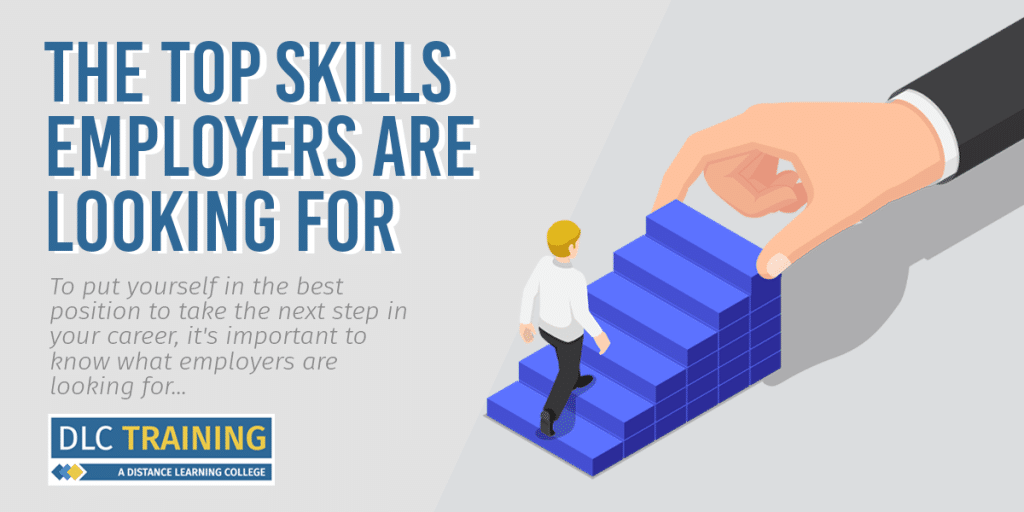To put yourself in the best position to take the next step in your career, it’s important to know what employers are looking for. When employers are hiring, they look for their candidates to have certain hard and power skills.

Power Skills
Power skills include those that relate to the way you work and interact with other people. These skills are transferable, and tend to depend on an individual’s personality. According to Zety, the top 5 most important power skills are:
- Teamwork
- Communication
- Time management
- Problem-solving
- Creativity
Teamwork
Teamwork came out on top as the most important power skill. Businesses are essentially split into teams (departments) to make the company run as efficiently as possible. Without teamwork, tasks would fall through and innovation would not occur. Effective teamwork is therefore vital to the success and growth of every business. To improve teamwork and develop your leadership skills, you could consider studying a course. ILM and CMI provide accredited online training courses in team performance and leading.
Communication
Communication goes hand-in-hand with teamwork. Ideas are brought into fruition and problems are solved when communication is carried out effectively. Without clear communication, important tasks can be missed, and this in turn could have a negative impact on the business. There are two types of communication, including oral and written. Oral communication consists of passing information verbally, via telephone or face-to-face. Written communication consists of passing information in a written form such as an email. It’s important to work on both aspects of communication to ensure clarity. Keep messages concise and brief, and practice active listening to improve your communication.
Time Management
Time management is very important to employers. They need to ensure the time you spend at work is used as productively as possible. The best way to do this is to use a time management strategy that works well for you. Making to-do lists, prioritising, and setting deadlines are some of the ways you can improve your time management.
Problem-solving
Issues occur all the time in the day-to-day running of businesses. To ensure they don’t impact the business, employees need to be good problem solvers. There are a number of ways to improve your problem-solving abilities. For example, you can watch how other colleagues tackle problems, brainstorm ideas, and develop your technical know-how.
Creativity
Creativity affects all aspects of business growth and development. It supports problem-solving and it can make the completion of tasks more efficient. It can also help businesses with innovation and change. To improve your creativity, dedicate some time to thinking creatively and brainstorming ideas. It’s also beneficial to run your ideas past other colleagues to get their take on it. Every individual has different perspectives, knowledge and experience. The more people that take part in idea generation the more likely it is to be a creative one!
Hard Skills
Hard skills include abilities you have that are specific to your role. These skills can develop with training. According to Zety, the top 5 most important hard skills are:
- Analytical skills
- High-level IT skills
- Basic computer knowledge
- Customer service skills
- Presentation skills
Analytical skills
Analytical skills are a combination of skills which allow you to gather, interpret and integrate data. This is important for businesses to be able to improve their performance in areas that need attention. You can improve your analytical skills by learning and observing. You can also take part in activities that improve your cognitive processes like brain training games. It’s also beneficial to continue your development in your role, you can do this by studying an online course.
High-level IT skills
Information technology (IT) is at the centre of every business. It creates systems, holds data, and provides another communication channel. IT makes the majority of business processes more efficient. Employers class this as an essential skill for their employees. The better you are with IT, the more efficient you will be at completing tasks, solving problems and adapting to change. To improve your IT skills, you could consider taking an advanced IT course.
Basic computer knowledge
The majority of roles within a business require some knowledge of using a computer. Whether that be to collect information, to communicate messages or log data. Without basic computer knowledge, you would also find it difficult to develop high-level IT skills. To develop your basic understanding, you can observe others, do some research or complete an introductory course.
Customer service skills
Customer service skills are very important to employers. Without customers, there would be no business. Speaking with customers can be a regular part of some jobs and a not-so-regular part of others. Regardless of how often you interact with customers, you need to show employers they can trust your customer service abilities. You can improve these skills by practicing your active listening and taking advice from others with experience. You could also consider studying a customer service course.
Presentation skills
Presentations are a quick and effective way to provide information to a large number of people in a short space of time. The best way to improve your presentation skills is to practice. Practice presenting as much as possible, and request feedback so you know what to work on.
If you’re not sure what route to take with your career, read our guide on how to find a job you love. For advise on taking your career to the next level with accredited online training, contact our course advisory team today. Call: 0800 012 6770 or email: info@dlctraining.co.uk.